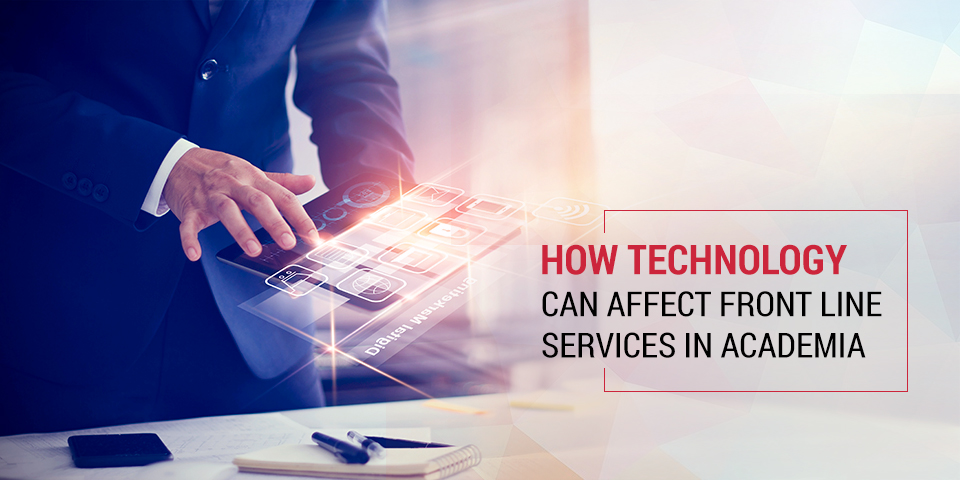How Technology Can Affect Front Line Services in Academia
The growth of exponential technologies such as chatbots, artificial intelligence (AI), and augmented reality etc. present big potential for enhancement of services in education sector.
Although, implementation of technology has its own challenges, but once implemented it has long term benefits in improving efficiency of various processes. One such process where technology can and is playing an important role in enhancing services, is front end marketing.
Most new technologies serve to help outward facing jobs perform their tasks more efficiently. Read this blog post to know the future of service technology and how it will change day to day customer interactions in academia.
Serving students in academia is very crucial since it deals with their career which ultimately decides their future life. Technology can assist counselling teams in colleges by providing effective solutions to solve students’ queries. Its tools can streamline counsellor workflows. By adopting service technology solutions in academia, colleges can efficiently manage the increasing queries of admission aspirants.
Now let’s see in detail how customer service will shape over the next few years with growing use of technology in education sector.
1. Web Conferencing
It’s always better to communicate with people whom you can also see. A lot of non-verbal communication takes place in this process which helps in building trust factor.
So use of web conferencing in counselling will increase the potential of handling queries. Face to face interactions with prospective applicants through this medium will facilitate better conversion rate.
2. WhatsApp or Facebook Messaging
With growing use of smartphones and internet technology, millennials expect you to be available always to answer their queries. This expectation of real-time messaging and responsiveness is bringing big changes in serving customers in educational institutes.
In addition to WhatsApp and Facebook Messenger, on-site chatting is also expected to further calibrate counselling services. Real-time messaging is more personalized and suited to individual informational needs for taking informed career choices.
Analytics also show that real-time messages register more engagement rate and responsiveness as compared to emailers.
3. Chabot Technology
Bots are the future of customer service.
Bots can be as conversational as a human being depending upon the requirement. Bots present great opportunity to interestingly engage your customers and reduces dependence on a human interface.
Many edutech companies are empowering bot technology to facilitate self-service in education. Over next few years, this technology will fully automate the student counselling process and bring greater accountability to the system. It will create smarter customer-facing teams who will be better equipped with information to handle queries.
Student representatives in colleges spending lot of time in answering repeated queries. But with chatbot technology, you don’t have to repeat the same job over and over again. It is just a matter of time when AI and bot will become mainstream communication channels and tools to handle front line customer services in academia.
4. Social Media Technologies
Social media is increasingly becoming a valuable customer service channel. It is empowering aspirants by providing instant information and reviews about a college.
Social media has increased accountability of academic institutions. Its instant reaction mechanism places greater pressure on institutes to solve queries more efficiently. Student reps will need to manage social media interaction more frequently and spontaneously.
Platforms such as Facebook and Twitter are viable options for institutes that are looking to reach out to a large student population. Hence these mediums will continue to open new opportunities for colleges to address inbound queries of admission seekers.
The Future of Front Line Services in Academia
The concept of customer success is spreading quickly and growing in educational institutions. Over next 5 to 10 years, use of technology in enhancing customer service orientation in academic institutions will become a competitive differentiator to drive success.
But use of technology will also pose a novel challenge for institutes looking to grow students’ base. It will raise the bar even higher for counsellors to improve workflow efficiency. It will be exciting to see how technology brings down the cost of customer relationship management in institutions.
By adopting technology, front end teams will become more empowered by data analytics. Technology will enable Universities to serve their customers more efficiently by providing useful customer insights.
Additionally, data analytics will also help marketing teams to use these insights to run promotional campaigns. It will help them to understand informational needs of admission seekers for designing healthier sales pitch. Adopting technology in students’ service desk will ultimately lead to better profile mapping of students for a particular course.
Over time, with increased technology interventions, counsellors will be less involved in routine query handling jobs and can develop a much strategic role for themselves in the organization. Due to automation, less-complicated problems and smaller functions will be solved by technology driven modules.
Technology will significantly improve the experience of aspirants while dealing with a college especially in pre-admission phase as it allows more personalized interaction. Additionally, with integration of technology in other areas of student support services, college reps can troubleshoot student queries more efficiently. They can focus their energy on improving your net performance score which is an important indicator of customer satisfaction.




